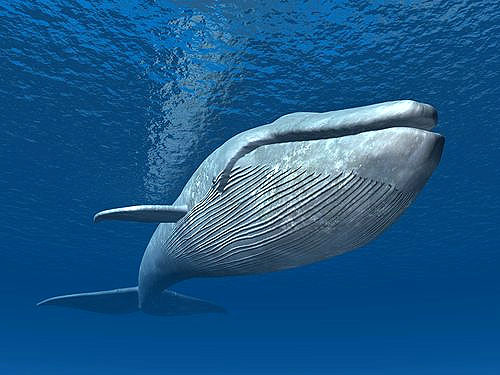Illegal Whaling - Japan
The UK is strongly opposed to commercial whaling and will continue to fight for the protection and welfare of these majestic animals
- Michael Gove, DEFRA.
Restoration of the Whaling Issue
The latest whaling debate was sparked by Japan who announced just before Christmas 2018 that it will be leaving
the IWC to commence commercial whaling from July 2019 within its own territorial waters, an area of roughly 4.5
million square kilometers.
As an international organisation based upon voluntary membership, the IWC has no authority to compel adherence to
its policies or regulations by non-member states. Accordingly, by leaving the IWC, any international obstacles
toward the establishment of an openly commercial whaling operation within Japan’s exclusive economic zone is
avoided.
Japan's covert attempt to bury the release of bad news under cover of a national holiday failed. Such news was
bound to emerge with a response of global outrage, re-fueling the whaling issue and anti-whaling groups.
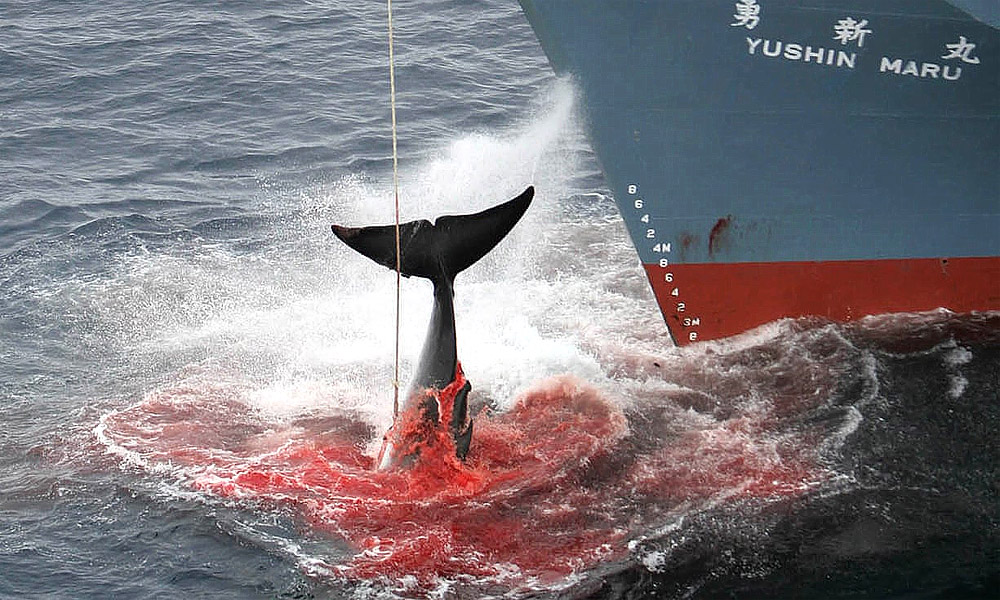
Whale caught by exploding grenade harpoon
The UK will continue to fight for the protection and welfare of these majestic animals
On hearing the news, Michael Gove, the UK's Environment, Food and Rural Affairs Secretary took to Twitter
and condemned Japan for restarting commercial whaling. He added: "The UK is strongly opposed to commercial
whaling and will continue to fight for the protection and welfare of these majestic animals".
We should be outright furious at Japan's plan to start whaling again - Boris Johnson

Boris Johnson MP
Boris Johnson: "Where is the anger? Where is the outrage?"
UK's Secretary of State for Foreign and Commonwealth Affairs (now Prime Minister) - Boris Johnson, expressed his outrage in The
Telegraph on 30 December 2018. He said "It is appalling news that Japan has decided to recommence the
commercial killing of whales, and every single potential justification is nonsense. It is simply not true that
there are plenty of whales in the sea and that they can now be killed at will." Many of the commenters on the
newspapers website proposed retaliatory actions, including an organised boycott of Japanese goods worldwide. The
full article is available online in the Sydney Morning Herald.
Japan's continuation of an industrial scale mass slaughter of whales is devastating news where up to 90% of some
populations have already been wiped out. Japan in not alone, other respected nations, including Iceland and Norway have a
shameful whaling
industry that has no place in the 21st Century. Whaling is needless, inhumane, anti-environmental and compromises
remaining whale and fish stocks and ocean ecosystems.
Japan will stop at nothing to continue whaling, including:
The following provides some important insights behind Japan's whaling obsession:
Commercial whaling under the banner of 'Scientific Research'
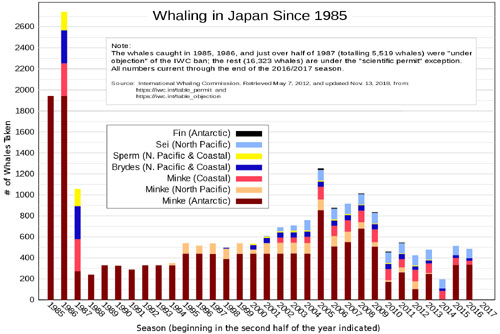
Whales Killed per Year Since 1985
In 1987, using a loophole in the international regulations, Japan continued whaling at a commercial level under
the banner of ‘Scientific Research’, which also allowed Japan to set its own quota of whales to be killed for
scientific research.
The IWC intention of the scientific research regulation was that the “number of whales a country could take for
science was less than 10. For instance, the possibility of finding a new animal and thus needing to take some in
order to describe them scientifically."
Under the banner of 'scientific research', Japan killed more than 14,000 whales which resulted in just two
international peer-reviewed scientific papers and a failure to achieve any of the stated objectives. The mountain
of whale meat accumulated is close to 5,000 tonnes. The number of whales that Japan killed exceeded all other
countries’ scientific whaling programmes combined throughout history.
Making clear the UK’s opposition, Fisheries Minister Richard Benyon said: "Japan’s slaughter of whales,
supposedly in the name of science is cruel and scientifically unnecessary. We urge Japan to stop this needless
killing. It undermines international efforts to conserve and protect whales and goes against the spirit of the
International Whaling Commission’s moratorium on commercial whaling. There is absolutely no justification for
continued whaling and we will continue to oppose whaling at every possible opportunity."
Since 1988, Japans 'scientific research' whaling has cost the government $400 million in taxpayer subsidies.
In 2014, the UN International Court of Justice (ICJ) ordered Tokyo to cease its whaling activities since they did
not meet any conventional scientific standards. As a result, the 2014-15 hunt was cancelled, only to re-emerge a
year later under the guise of another scientific research programme.
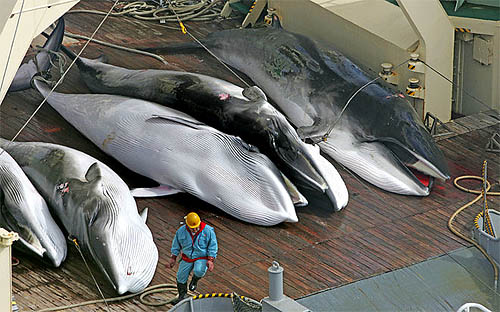
Credit: Jeremy Sutton-Hibbert / Alamy
122 pregnant Minke whales killed for 'scientific research'
The findings of an expert panel that advises the International Whaling Commission’s Scientific Committee
has stated “Never before has a body associated with the Scientific Committee told Japan that they have failed
to demonstrate a need for killing whales.” The panel had rejected Japan’s plan for resuming the killing of
Minke whales in the Antarctic. Japan, however, said it will continue with its whaling plans.
In the name of 'scientific research' Japan killed 333 Minke whales of which 122 were pregnant and another 114
were juveniles. Whales are slow to mature and they reproduce in small numbers, so the killing of a pregnant whale
is a double blow to the population. But from the position of the Japan Fisheries Agency, who regard Minke whales as
"the cockroaches of the ocean", the killing of a pregnant whale may be regarded as killing two
birds with one stone.
After the slaughter of 327 Minke whales, the UK government registered its abhorrence
Alexia Wellbelove, senior program manager at Humane Society
International has said, "The killing of 122
pregnant whales is a shocking statistic and sad indictment on the cruelty of Japan's whale hunt. It is further
demonstration, if needed, of the truly gruesome and unnecessary nature of whaling operations, especially when
non-lethal surveys have been shown to be sufficient for scientific needs."
Non-lethal data-gathering techniques promoted by whale researchers include underwater acoustic methods, biopsy
darts, aerial surveys, satellite tagging and drones.
There is no demand for whale meat in Japan
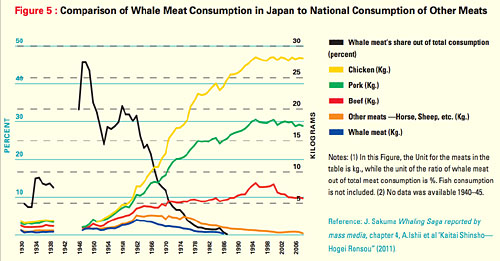
Whale Meat Consumed Compared to Other Meats Since 1930
Enlarge
The Japanese prefer to eat chicken, pork, beef and other meats. The small amount of whale meat that is consumed
is by the older generation out of nostalgia, or by the younger generation and tourists out of curiosity.
The demand for whale products in Japan has almost disappeared and continues to fall. By 2013, the per-capita
consumption of whale meat was down to one ounce (28 grams) per year.
Due to sea pollution, Japanese consumers are becoming increasingly aware that whale meat is toxic. It contains mercury, cadmium, PCB and DDT levels far exceeding the
safe levels for human consumption.
An increase in global awareness on the toxicity of whale meat and related products may encourage Japan to review
its whaling policy.
Japan's Institute of Cetacean research failed to sell 900
tonnes, or three-quarters of all the meat harvested from the last round of its so-called scientific research
whaling in the north-west Pacific.
Why do the Japanese continue to hunt whales if there's no demand for whale meat?
Money and power is one reason. Whaling in Japan is controlled by a cosy triad, known as the ‘Whaling Iron
Triangle’ comprising:
- Ministry of Agriculture, Forestry and Fisheries
- The Institute of Cetacean Research
- The Japan Fisheries Association
Japan's whaling industry has been loss-making for over 33 years and depends on taxpayer subsidies and funds
diverted from relief aid. The money is used to keep the industry afloat and to provide 'financial aid' and
bribes to induce countries to support Japan's whaling policy. The government subsidies are received by the
non-profit Institute of Cetacean Research (ICR), set up to run Japan's whaling programme. The ICR also receives
income from the sale of 'scientific research' whale meat.
A year after it was set-up in 1987, the ICR started to receive subsidies. Between 1988-2010, taxpayer subsidies
amounted to US$150 million. Since then, the average annual subsidy increased to US$9.78 million. Then, In 2014, the
government subsidy was US$50
million.
The Institute of Cetacean Research not only runs Japan’s whaling program, it also owns Japan’s whaling fleet,
hires its mariners, and distributes and stores whale meat. According to 'The Diplomat', It is also where many
retired officials from Japan’s fisheries agency and other bureaus go after retirement, forming an extended iron rice
bowl system of lucrative sinecures that helps ensure Japanese whaling survives. More insights from a Japanese
perspective may be found from this BBC News
report.
Personal bribes, cash payments and prostitutes
On 13 June 2010 London’s Sunday Times newspaper reported that
its investigation had exposed Japan for bribing small nations with cash and prostitutes to gain their support for
the mass slaughter of whales. "Such backroom stitch-ups at the IWC have often been rumoured, but they have never
before been captured on a video camera". The lobbyist was, in fact, an undercover reporter from the Sunday Times,"
as reported in the archive
news of GreenEcoPeace
The representatives of six countries were contacted, and the paper caught on hidden video high government
officials of various countries making comments, such as “we switched to supporting whaling since we want official
development assistance from Japan” and “we received money from Japan to cover our delegation’s transportation and
hotel expenses.”
The payments were made in cash handed over in brown envelopes at the beginning of the meeting. Some of those
interviewed even described call girls being made available to them during official visits to Japan. Japan’s
largesse also extended to paying for the hotel room and flight of the supposedly neutral IWC Chair, Anthony
Liverpool of Antigua and Barbuda.
In terms of the whales themselves, The Sunday Times editorialised that, “The fate of these remarkable
creatures should not be decided by brown envelopes and prostitutes.”
In June 2010, the BBC reported that Japan used
aid money to persuade developing countries to support its whaling.
Interestingly, Mali, Laos and Mongolia are members of the International Whaling Commission who also vote
for Japan yet they are entirely surrounded by land and have no tradition of whaling.
Using tsunami relief funds to kill whales
On 11 March 2011, a magnitude 9 earthquake shook north eastern Japan, unleashing a savage tsunami. The tsunami
caused a cooling system failure at the Fukushima Daiichi Nuclear Power Plant, which resulted in a level-7 nuclear
meltdown and release of radioactive materials. The total number of deaths caused by the tsunami was 19,575 as of
2017 September.
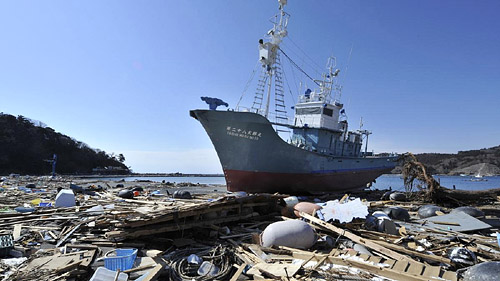
Image credit: Kazuhiro/Getty
Beached whaling boat following the 2011 tsunami
Enlarge
Japan has admitted that some of its disaster funds earmarked for earthquake and tsunami relief will
instead go to boost security for its so-called “scientific” whale hunts. Japan Fisheries Agency officials admitted
that about US$29 million would be taken from a US$6.4 billion portion of disaster funds earmarked for
fisheries related spending,
The Japan
Fisheries Agency says the trip's use of $28 million from the earthquake recovery fund is legitimate, because it
is taken from the government’s own quake recovery fund.
Greenpeace Japan executive director Junichi Sato says
"It is used to cover the debts of the whaling program because the whaling program itself has been suffering from
big financial problems."
The cockroaches are killing all the fish
From July 2019, Japan will withdraw its commercial whaling operations to around its own territorial waters and
exclusive economic zone. Cutting through all the unconvincing justification propaganda behind this move, the most
likely reason is that Japan feels convinced that whales, referred to as cockroaches, are responsible for the decline in fish stocks and that gluttonous whales are threatening fish stocks. This argument is also made by Norway and
Iceland and is misleadingly used to increase support for whaling.
The National Oceanic & Atmospheric Administration US Department of Commerce reports that "In truth, humans are primarily responsible for fisheries declines. It is humans who continue to threaten the world's stocks through overfishing and reluctance to allow stocks to naturally replenish".
There is no qualified scientific evidence that cetations (whales, dolphins and porpoise) have harmed commercial
fisheries. There is an increasing body of evidence that more whales equal more fish. Although some whales do eat
fish, they give back to the ecosystem more than they take enabling fish to thrive and multiply. On the other hand,
man has taken fish and given nothing back except degradation of the marine environment.
Killing whales will not increase fish populations. Whales are not the top ocean predator, Man is responsible for
overexploiting 75% of all commercial fish stocks. By killing whales around its own exclusive economic zone, Japan
will further deplete its remaining fish stocks by destroying the vital ecosystem
functions provided by whales.
Japan's overfishing problem started in the 1800's but only became noticeable around the mid 1900’s. Japan is
the largest fish-eating nation in the world consuming 10% of the world catch.
Fish catches were the
third in the world in 2000. The overfishing problem is becoming serious causing depleted catches and some
species to be fished out.
Global warming and accompanying rising sea temperatures are also impacting Japans coastal ecosystem. The Japanese
environment ministry has said that 70% of the Sekisei lagoon in Okinawa had been killed by a phenomenon known as bleaching.
The best solution to the problem includes: rebuilding overexploited stocks by relieving fishing pressure,
improving catch selectivity of fishing gear and fishing exploitation patterns, protecting habitats, creating
generous marine protected areas and no-take zones, addressing subsidised industrial scale fleets at WTO level,
address destruction of habitat and sea bed scouring caused by trawl fisheries, encouraging cultural shift in
fish-eating patterns, where possible, stricter monitoring, control and enforcement of illegal fising activities,
practices and endangered fish-take, encouraging and supporting fishermen to take up alternative occupations e.g.
profitable whale tourism.
The 'whales-eat-all-the-fish' argument
This seemingly logical statement is fast becoming a myth in the light of modern scientific research. The argument
may be easier to blindly accept than understand the important role of whales in the ecosystem in replenishing fish
stocks. Therefore, the 'whales-eat-all-the-fish' argument is cultivated by the whaling nations to justify the
killing of whales for whatever reason or agenda. It also distracts from the root cause of the problem - overfishing
and fisheries mismanagement. Bearing in mind that Japan consumes 1 in 10 of the world's fish catch.
A single blue whale, for example, eats up to 4000kg (8,800 lbs) of krill every day for a four-month period.
Yet, the whales do not eat all the krill. They regenerate krill by fertilising the phytoplankton upon which the
krill depend. Researchers have found that when baleen whales are killed in the southern ocean, the krill numbers
decline, which then affects the whole food chain. When whales are present, the krill that they consume are more
than replenished sufficient for themselves and all the other sea creatures, fish and birds that feed on krill.
Science is increasingly proving that whales are not a competitor for fish but a cultivator of fish and partner
with man. Therefore, it makes no sense that humans keep killing them through whaling, poison, plastic, sonar, ship
strikes, entanglement etc.
The Japan Institute of Cetacean Research recently published a paper to reinforce the 'whales-eat-all-the-fish'
argument to justify their continuation of commercial whaling. The paper was received by Greenpeace Research
Laboratories, University of Exeter, UK as A Modern Myth Based on Pseudo-Science.
A fact not often considered is that when whales were plentiful, so too were fish, Modern scientific research is
increasingly showing us the vital role whales play in maintaining the health of the oceans, supporting fish
populations, generating oxygen and removing carbon dioxide from the atmosphere. Without whales, ocean life as we
know it would not exist and fishing industries would totally collapse.
The legacy of sea dumped munitions around Japan
Fish stock security around the coastal waters of Japan are increasingly threatend by the past dumping of
conventional and chemical munitions.
According to US veterans, tones of chemical weapons were dumped of Okinawa in 1969. Following
World War II, The United States dumped 6,600 tons of the Imperial Japanese Army’s stocks of munitions — including
mustard agent and hydrogen cyanide, a potent asphyxiant. According to records held by the Ministry of the
Environment in Tokyo, disposal was at more than 20 sites off Tokyo and Ibaraki and Hiroshima prefectures. Two of the
substances thought to have been dumped off Okinawa are the nerve agents sarin and VX, which are believed to persist
for long periods in ocean waters. A 2009 report by the Monterey institute suggested that lewisite - another of the
substances stored on Okinawa and possibly dumped off its coast - can contaminate marine life for decades.
In Okinawa during the late 1960s, there were a series of incidents which sparked residents’ fears of
chemical-weapons leaks. Those included a spate of mass fish deaths and about 200 children becoming sick after they
had been swimming in the sea near Ten Gan Pier.
A chronology of chemical weapons disposal at Okinawa is provided under Operation Red Hat.
According to the Monterey institute’s 2010 report, “The risks may be higher today than when the dangers of the
dumped materiel were first acknowledged because containment failure, due to corrosion, is thought to occur after 50
years.”
A detailed paper on the sea dumping of toxic chemical weapons around Japan's coastal waters
concludes: "In light of the potential risk these chemical weapons pose both to the environment and local communities
not only in Japan but also in the Pacific Ocean, further research and action is urgently needed".
Known details of the conventional and chemical munitions dump sites around Japan, and the rest of the world, is
reported in our environmental page.




















